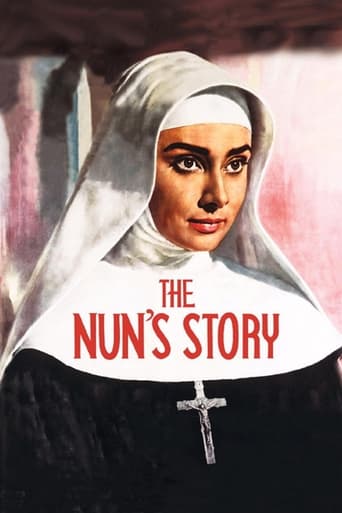tavm
After years of reading about this movie, I finally saw The Nun's Story on Netflix disc with my mom who claimed to have seen it before but as the picture went on, she remembered none of it. So she ended up being as fascinated by what was going on in it as I was and told me some pertinent facts about the Catholic faith during some of the movie. Fred Zinnemann made a beautiful but also at times, intense, drama about a young woman's choice in joining the convent and the sacrifices she had to take in doing so. Audrey Hepburn conveys just the right amount of restraint and emotional feeling in her role of becoming Sister Luke having to abandon her earlier identity of Gabrielle. And Franz Waxman does quite a swelling score during most of the picture though the ending scene is all the greater with no score at all. So on that note, The Nun's Story is highly recommended.
jlgAltman
It's wonderful to catch up with classic films that may have lost of their buzz over time. THE NUN'S STORY is a truly perfect work but not one that is mentioned in the same breath as other classic films from great directors like Fred Zinneman and star Audrey Hepburn. This sublime film is subtle to the extreme. Almost flat in fact, depicting the inner struggle of a nun who wishes nothing more than to be a citizen of the world, something the convent does not allow. THE NUN'S STORY takes its time. There is no emotion. No evil. No greatness. Just the struggle to define one self and become the person you must be. Simply stunning, subtle, and perfect!
Hotwok2013
"A tree is known by the fruit that it bears, or a man by his deeds". This quote has been variously attributed to Saint Basil & Jesus sermon on the mount. Whoever or whatever it's original source, no-one can deny its deep meaning & truth. The films directed by Fred Zinnemann attest to his greatness as a movie-maker. "High Noon", "A Man For All Seasons", "The Day Of The Jackal", "Julia" & "The Nun's Story" are all films of the highest quality. Audrey Hepburn must have believed in the serious content & honesty of "The Nun's Story" because she gives easily her finest ever performance as an actress. Gabrielle Van Der Mal (Hepburn) decides as a young woman to become a nun & leave home. Her doctor father (played by Dean Jagger) is terribly upset at losing his most beloved daughter. She is re-named Sister Luke by her convent & eventually serves as a nursing nun in the African Congo. After some years there she contracts tuberculosis. The resident doctor serving there is Dr. Fortunati (Peter Finch) who is both an exceptional doctor & an atheist knows that if he cannot cure her she will have to be sent back home to her Belgian convent. He has come to rely on her tremendously for her nursing skills &, like her father before, hates the thought of losing her. Dr. Fortunati does cure her but she is eventually sent home anyway by the senior nun (Peggy Ashcroft) with a patient for whom only Sister Luke is qualified to tend. Sister Luke is eager to return to Africa but is told by the Mother Superior (Sybil Thorndike) that she must spend some time back in her home convent to renew & refurbish her faith. After meeting her father again for the first time in many years she asks after his welfare. He replies, "Still lonely for you". It is a heart-rending moment but this movie is full of them. Mention must also be made of Franz Waxman's musical score for the film which is just fabulous. When Gabrielle receives her nuns veil to become Sister Luke a glorious crescendo is played like a queen receiving her crown at her coronation ceremony. WW2 has begun & whilst back home in Belgium nazi Germany has conquered & occupied her country. Her father is killed during the furore & her faith has taken a shattering blow. She still believes in god & the Christian faith but she is no longer able to obey the strict rules of her convent & decides she must leave it. The Mother Superior tries hard to dissuade her from going, as does a cardinal, but to no avail. She tells the latter, "Father, if you do not lay my case before his grace (the Pope) i shall do something that will kill me. I shall leave without permission". It doesn't matter whether you are at all religious or not, this is a great movie.
secondtake
The Nun's Story (1959)I knew I would enjoy at least Audrey Hepburn, and she's fabulous. But the movie came on as a Christmas Day feature and I worried that it would have too many religious overtones. Then as the credits rolled I saw it was directed by Fred Zinnemann. Zinnemann? I wondered what would draw him to this kind of story. My expectations tripled.I was not disappointed. This is a measured but never slow movie. It's totally beautiful, it handles the sanctity of the convent with respect, never tipping into sappy adoration. Hepburn is what you want from her, lively and independent, and this is a natural conflict in a world of discipline and loss of independence. And it's also an evolving, changing story with a couple of major twists as it goes. By the end you see very much why Zinnemann wanted to do this and I can't tell you that. See for yourself.The conflict between self and community, between having your own opinion about something and being forced to follow a larger set of rules that might not always be best, is the core of the film. When do you rebel? When do you submit? And if you have agreed beforehand to devote your life to submission, do circumstances allow an exception? A total change of heart?If you think this sounds boring it is not. You might give Hepburn the biggest credit here--she's a natural and you are nothing but sympathetic--but the directing the cinematography are huge, as well. Behind the camera is Franz Planar, who did such trifles as "Holiday" and "Letter from an Unknown Woman" as well as two Audrey Hepburn movies "Roman Holiday" and "Breakfast at Tiffany's." If you have seen any of these (or all) you'll know how really perfectly they are filmed, with the camera in service to the story.The story, by the say, in "The Nun's Story" is very much the point, even beyond the moral. When does a young woman leave a loving and comfortable home and join a convent, face a loss of self and freedom, and yet still feel useful to the world? Hepburn's character (who changes names, in part of the effort to leave the past behind), wants to go to Africa to serve the needy. How this is thwarted--or not--you'll see, but you really root for her. You see her brush against her principles in every way. And you see a larger principle arise--do the right thing. And she does. It's beautiful. It ought to make you cry. It will easily engage and move you.




